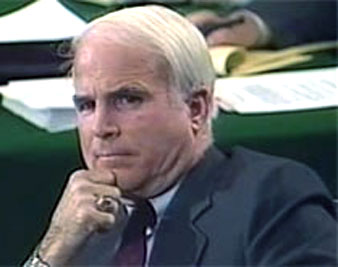 John McCain in 1990 during S&L hearings.
John McCain in 1990 during S&L hearings.
The parallels between the collapse of the savings and loan industry in the late 1980s and the Wall Street meltdown of today are unmistakable. Few pieces explain the roots of the S&L debacle–and its relevance today–better than legendary investigative reporter Robert Sherrill’s breathtaking 1990 exposé in The Nation, “S&Ls, Big Banks and Other Triumphs of Capitalism.”
The section on jailed Lincoln Savings & Loan magnate Charles Keating is particularly memorable. “If any one hustler was the living symbol of the underlying rot of the savings and loan industry as created by Congress and Reagan’s biography in the 1980s, it was Charles Keating,” Sherrill writes.
A constant in both crises is John McCain. McCain and four other senators (dubbed the Keating Five) intervened to protect Keating from banking regulators. McCain was later rebuked by the Senate Ethics Committee for “poor judgment” and embarrassed by the $112,000 in campaign contributions, trips and gifts he had accepted from Keating. Cindy McCain and her father were also partners with Keating in a shopping mall development in Arizona. In his autobiography, McCain called the Keating episode “the worst mistake of my life.”
McCain eventually became a born-again crusader for campaign-finance reform. But he continued to surround himself with corporate lobbyists and push for greater deregulation of the finance industry, missing the greatest lesson from Sherrill’s story: “thievery is what unregulated capitalism is all about.”
Sherrill’s pathbreaking reporting sheds light on all that was wrong with the deregulatory politics back then–as well as on what has fed our current financial crisis. It’s worth a second read: “S&Ls, Big Banks and Other Triumphs of Capitalism,” from the November 19, 1990, issue.
Ari Berman


